Accounting Theory 2022
VerifiedAdded on 2022/10/11
|16
|3300
|12
AI Summary
Contribute Materials
Your contribution can guide someone’s learning journey. Share your
documents today.
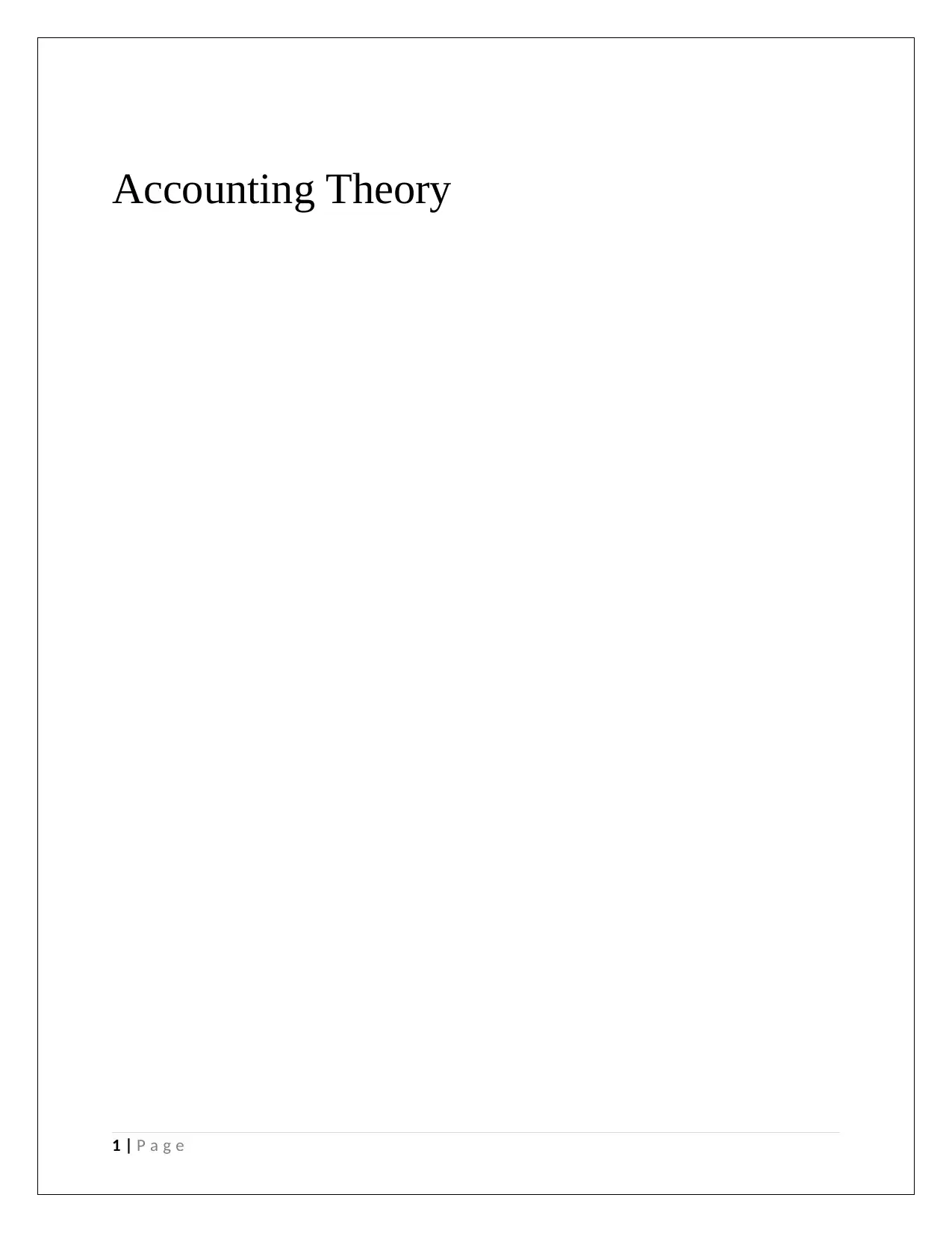
Accounting Theory
1 | P a g e
1 | P a g e
Secure Best Marks with AI Grader
Need help grading? Try our AI Grader for instant feedback on your assignments.
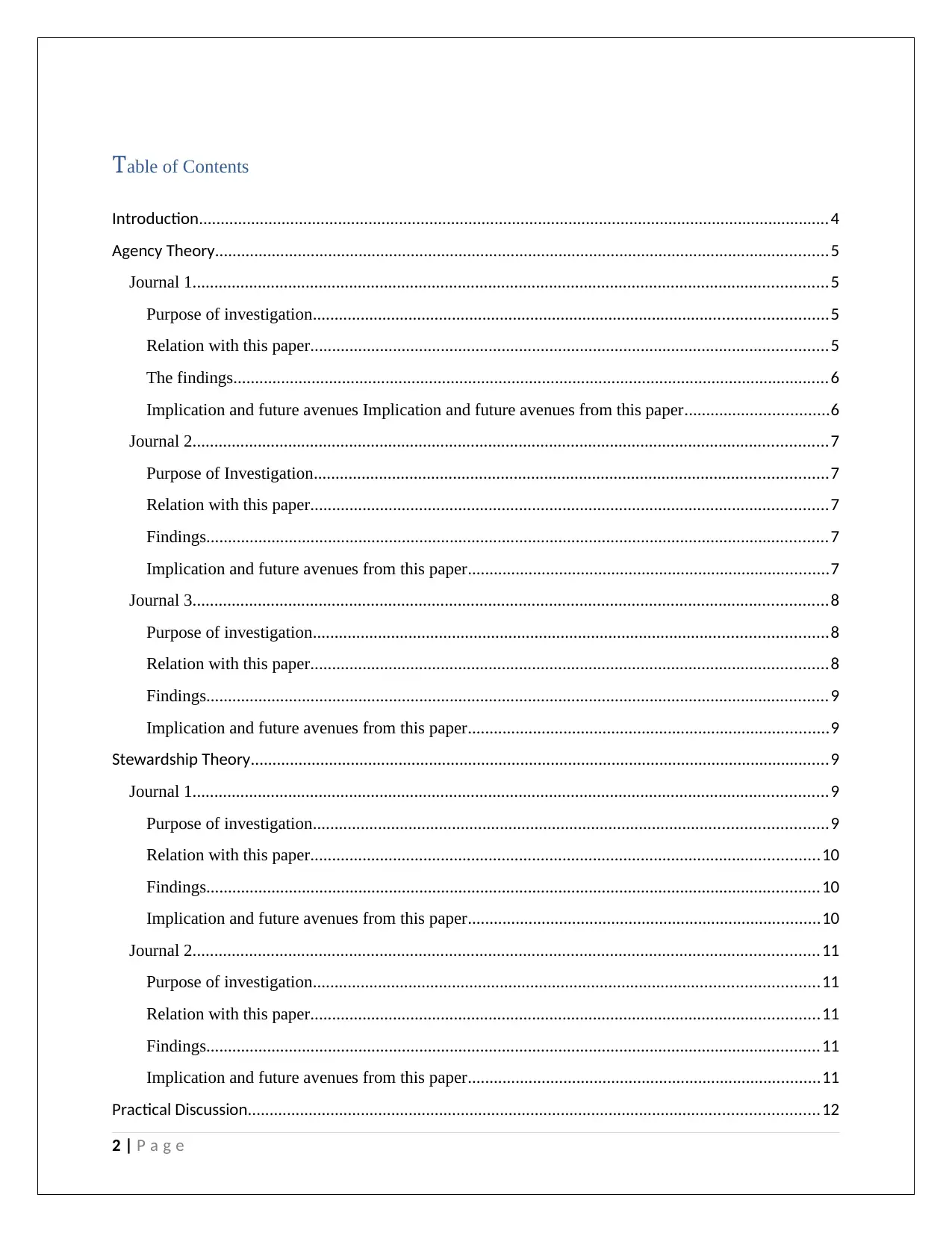
Table of Contents
Introduction.................................................................................................................................................4
Agency Theory.............................................................................................................................................5
Journal 1..................................................................................................................................................5
Purpose of investigation......................................................................................................................5
Relation with this paper.......................................................................................................................5
The findings.........................................................................................................................................6
Implication and future avenues Implication and future avenues from this paper.................................6
Journal 2..................................................................................................................................................7
Purpose of Investigation......................................................................................................................7
Relation with this paper.......................................................................................................................7
Findings...............................................................................................................................................7
Implication and future avenues from this paper...................................................................................7
Journal 3..................................................................................................................................................8
Purpose of investigation......................................................................................................................8
Relation with this paper.......................................................................................................................8
Findings...............................................................................................................................................9
Implication and future avenues from this paper...................................................................................9
Stewardship Theory.....................................................................................................................................9
Journal 1..................................................................................................................................................9
Purpose of investigation......................................................................................................................9
Relation with this paper.....................................................................................................................10
Findings.............................................................................................................................................10
Implication and future avenues from this paper.................................................................................10
Journal 2................................................................................................................................................11
Purpose of investigation....................................................................................................................11
Relation with this paper.....................................................................................................................11
Findings.............................................................................................................................................11
Implication and future avenues from this paper.................................................................................11
Practical Discussion...................................................................................................................................12
2 | P a g e
Introduction.................................................................................................................................................4
Agency Theory.............................................................................................................................................5
Journal 1..................................................................................................................................................5
Purpose of investigation......................................................................................................................5
Relation with this paper.......................................................................................................................5
The findings.........................................................................................................................................6
Implication and future avenues Implication and future avenues from this paper.................................6
Journal 2..................................................................................................................................................7
Purpose of Investigation......................................................................................................................7
Relation with this paper.......................................................................................................................7
Findings...............................................................................................................................................7
Implication and future avenues from this paper...................................................................................7
Journal 3..................................................................................................................................................8
Purpose of investigation......................................................................................................................8
Relation with this paper.......................................................................................................................8
Findings...............................................................................................................................................9
Implication and future avenues from this paper...................................................................................9
Stewardship Theory.....................................................................................................................................9
Journal 1..................................................................................................................................................9
Purpose of investigation......................................................................................................................9
Relation with this paper.....................................................................................................................10
Findings.............................................................................................................................................10
Implication and future avenues from this paper.................................................................................10
Journal 2................................................................................................................................................11
Purpose of investigation....................................................................................................................11
Relation with this paper.....................................................................................................................11
Findings.............................................................................................................................................11
Implication and future avenues from this paper.................................................................................11
Practical Discussion...................................................................................................................................12
2 | P a g e
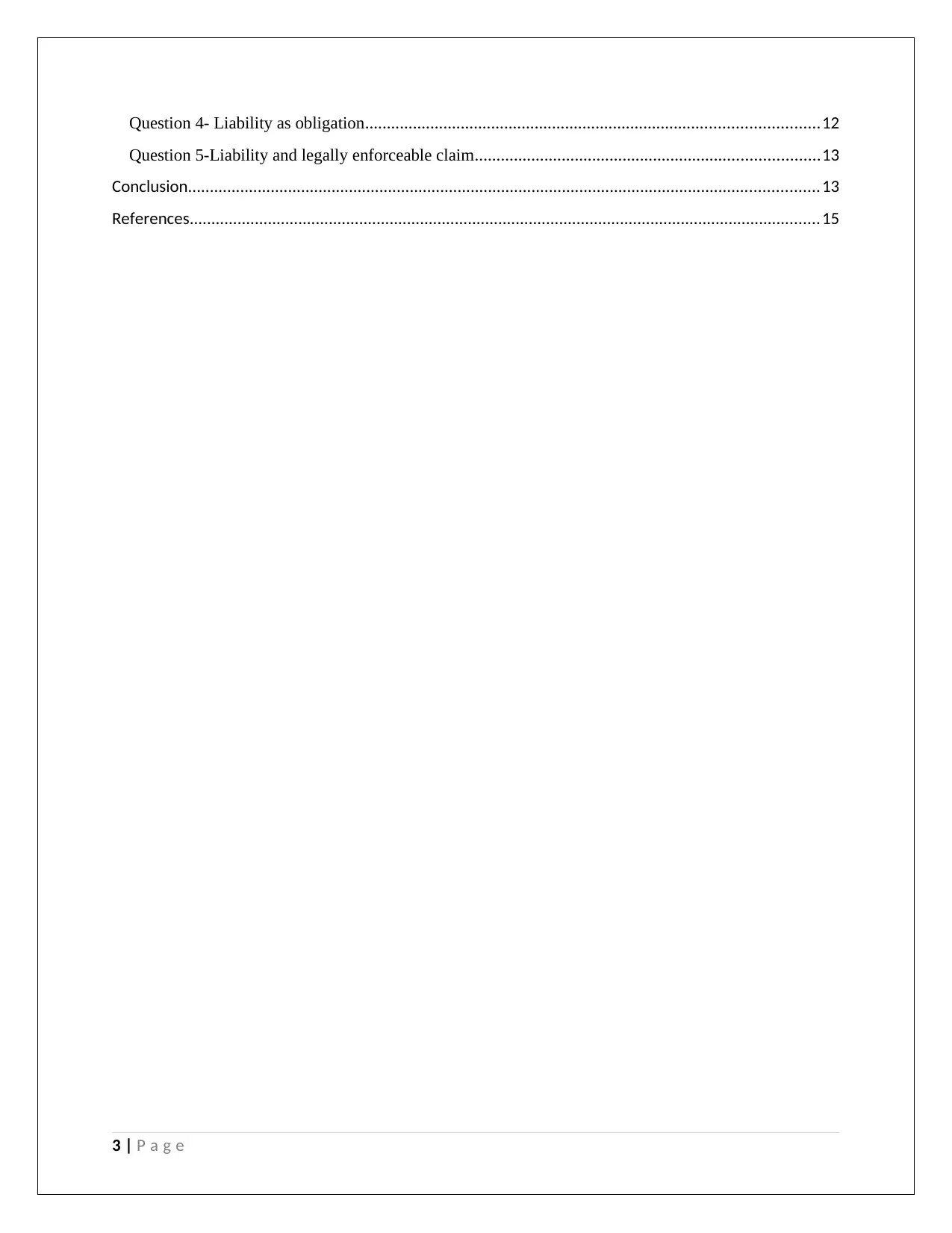
Question 4- Liability as obligation........................................................................................................12
Question 5-Liability and legally enforceable claim...............................................................................13
Conclusion.................................................................................................................................................13
References.................................................................................................................................................15
3 | P a g e
Question 5-Liability and legally enforceable claim...............................................................................13
Conclusion.................................................................................................................................................13
References.................................................................................................................................................15
3 | P a g e
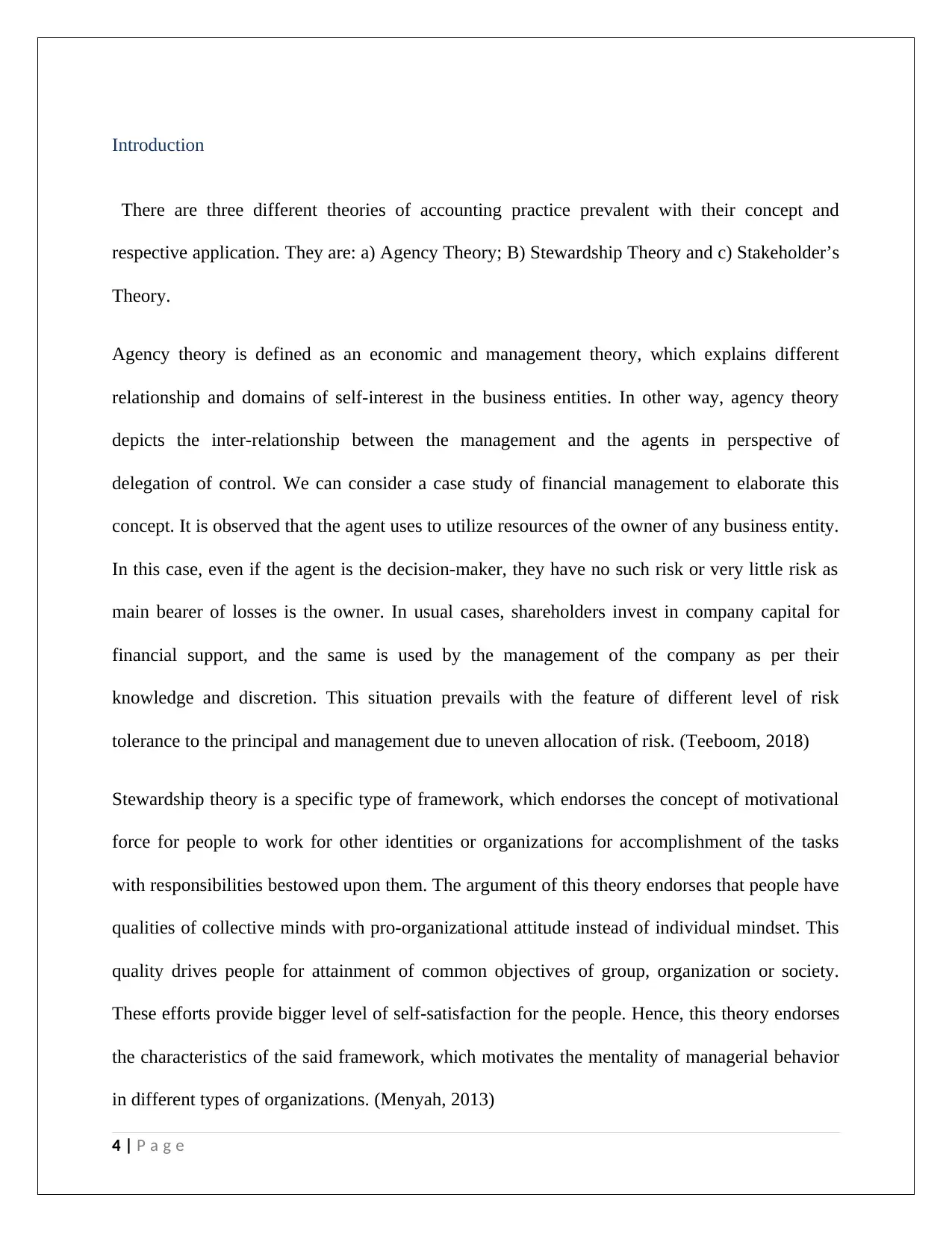
Introduction
There are three different theories of accounting practice prevalent with their concept and
respective application. They are: a) Agency Theory; B) Stewardship Theory and c) Stakeholder’s
Theory.
Agency theory is defined as an economic and management theory, which explains different
relationship and domains of self-interest in the business entities. In other way, agency theory
depicts the inter-relationship between the management and the agents in perspective of
delegation of control. We can consider a case study of financial management to elaborate this
concept. It is observed that the agent uses to utilize resources of the owner of any business entity.
In this case, even if the agent is the decision-maker, they have no such risk or very little risk as
main bearer of losses is the owner. In usual cases, shareholders invest in company capital for
financial support, and the same is used by the management of the company as per their
knowledge and discretion. This situation prevails with the feature of different level of risk
tolerance to the principal and management due to uneven allocation of risk. (Teeboom, 2018)
Stewardship theory is a specific type of framework, which endorses the concept of motivational
force for people to work for other identities or organizations for accomplishment of the tasks
with responsibilities bestowed upon them. The argument of this theory endorses that people have
qualities of collective minds with pro-organizational attitude instead of individual mindset. This
quality drives people for attainment of common objectives of group, organization or society.
These efforts provide bigger level of self-satisfaction for the people. Hence, this theory endorses
the characteristics of the said framework, which motivates the mentality of managerial behavior
in different types of organizations. (Menyah, 2013)
4 | P a g e
There are three different theories of accounting practice prevalent with their concept and
respective application. They are: a) Agency Theory; B) Stewardship Theory and c) Stakeholder’s
Theory.
Agency theory is defined as an economic and management theory, which explains different
relationship and domains of self-interest in the business entities. In other way, agency theory
depicts the inter-relationship between the management and the agents in perspective of
delegation of control. We can consider a case study of financial management to elaborate this
concept. It is observed that the agent uses to utilize resources of the owner of any business entity.
In this case, even if the agent is the decision-maker, they have no such risk or very little risk as
main bearer of losses is the owner. In usual cases, shareholders invest in company capital for
financial support, and the same is used by the management of the company as per their
knowledge and discretion. This situation prevails with the feature of different level of risk
tolerance to the principal and management due to uneven allocation of risk. (Teeboom, 2018)
Stewardship theory is a specific type of framework, which endorses the concept of motivational
force for people to work for other identities or organizations for accomplishment of the tasks
with responsibilities bestowed upon them. The argument of this theory endorses that people have
qualities of collective minds with pro-organizational attitude instead of individual mindset. This
quality drives people for attainment of common objectives of group, organization or society.
These efforts provide bigger level of self-satisfaction for the people. Hence, this theory endorses
the characteristics of the said framework, which motivates the mentality of managerial behavior
in different types of organizations. (Menyah, 2013)
4 | P a g e
Secure Best Marks with AI Grader
Need help grading? Try our AI Grader for instant feedback on your assignments.
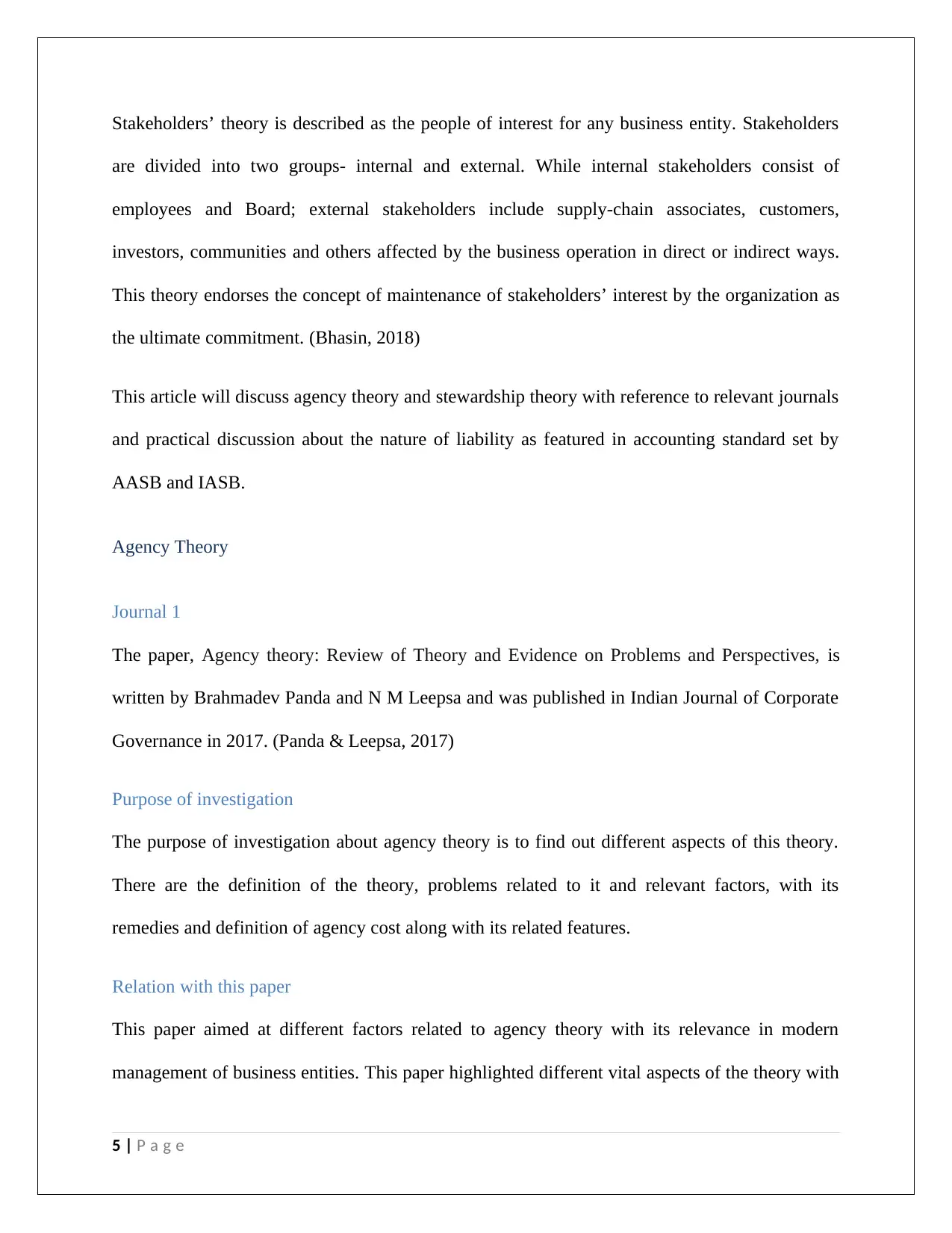
Stakeholders’ theory is described as the people of interest for any business entity. Stakeholders
are divided into two groups- internal and external. While internal stakeholders consist of
employees and Board; external stakeholders include supply-chain associates, customers,
investors, communities and others affected by the business operation in direct or indirect ways.
This theory endorses the concept of maintenance of stakeholders’ interest by the organization as
the ultimate commitment. (Bhasin, 2018)
This article will discuss agency theory and stewardship theory with reference to relevant journals
and practical discussion about the nature of liability as featured in accounting standard set by
AASB and IASB.
Agency Theory
Journal 1
The paper, Agency theory: Review of Theory and Evidence on Problems and Perspectives, is
written by Brahmadev Panda and N M Leepsa and was published in Indian Journal of Corporate
Governance in 2017. (Panda & Leepsa, 2017)
Purpose of investigation
The purpose of investigation about agency theory is to find out different aspects of this theory.
There are the definition of the theory, problems related to it and relevant factors, with its
remedies and definition of agency cost along with its related features.
Relation with this paper
This paper aimed at different factors related to agency theory with its relevance in modern
management of business entities. This paper highlighted different vital aspects of the theory with
5 | P a g e
are divided into two groups- internal and external. While internal stakeholders consist of
employees and Board; external stakeholders include supply-chain associates, customers,
investors, communities and others affected by the business operation in direct or indirect ways.
This theory endorses the concept of maintenance of stakeholders’ interest by the organization as
the ultimate commitment. (Bhasin, 2018)
This article will discuss agency theory and stewardship theory with reference to relevant journals
and practical discussion about the nature of liability as featured in accounting standard set by
AASB and IASB.
Agency Theory
Journal 1
The paper, Agency theory: Review of Theory and Evidence on Problems and Perspectives, is
written by Brahmadev Panda and N M Leepsa and was published in Indian Journal of Corporate
Governance in 2017. (Panda & Leepsa, 2017)
Purpose of investigation
The purpose of investigation about agency theory is to find out different aspects of this theory.
There are the definition of the theory, problems related to it and relevant factors, with its
remedies and definition of agency cost along with its related features.
Relation with this paper
This paper aimed at different factors related to agency theory with its relevance in modern
management of business entities. This paper highlighted different vital aspects of the theory with
5 | P a g e
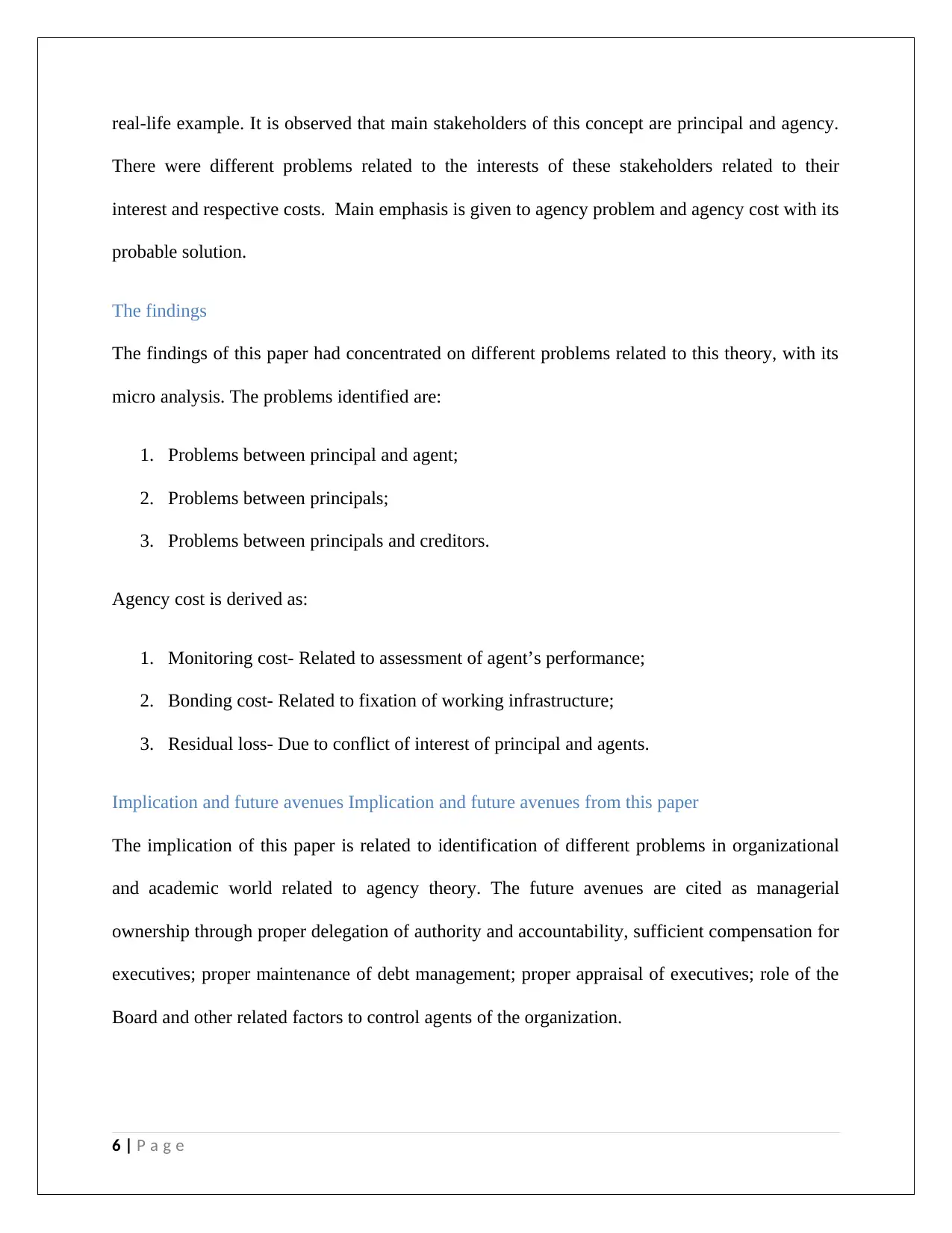
real-life example. It is observed that main stakeholders of this concept are principal and agency.
There were different problems related to the interests of these stakeholders related to their
interest and respective costs. Main emphasis is given to agency problem and agency cost with its
probable solution.
The findings
The findings of this paper had concentrated on different problems related to this theory, with its
micro analysis. The problems identified are:
1. Problems between principal and agent;
2. Problems between principals;
3. Problems between principals and creditors.
Agency cost is derived as:
1. Monitoring cost- Related to assessment of agent’s performance;
2. Bonding cost- Related to fixation of working infrastructure;
3. Residual loss- Due to conflict of interest of principal and agents.
Implication and future avenues Implication and future avenues from this paper
The implication of this paper is related to identification of different problems in organizational
and academic world related to agency theory. The future avenues are cited as managerial
ownership through proper delegation of authority and accountability, sufficient compensation for
executives; proper maintenance of debt management; proper appraisal of executives; role of the
Board and other related factors to control agents of the organization.
6 | P a g e
There were different problems related to the interests of these stakeholders related to their
interest and respective costs. Main emphasis is given to agency problem and agency cost with its
probable solution.
The findings
The findings of this paper had concentrated on different problems related to this theory, with its
micro analysis. The problems identified are:
1. Problems between principal and agent;
2. Problems between principals;
3. Problems between principals and creditors.
Agency cost is derived as:
1. Monitoring cost- Related to assessment of agent’s performance;
2. Bonding cost- Related to fixation of working infrastructure;
3. Residual loss- Due to conflict of interest of principal and agents.
Implication and future avenues Implication and future avenues from this paper
The implication of this paper is related to identification of different problems in organizational
and academic world related to agency theory. The future avenues are cited as managerial
ownership through proper delegation of authority and accountability, sufficient compensation for
executives; proper maintenance of debt management; proper appraisal of executives; role of the
Board and other related factors to control agents of the organization.
6 | P a g e
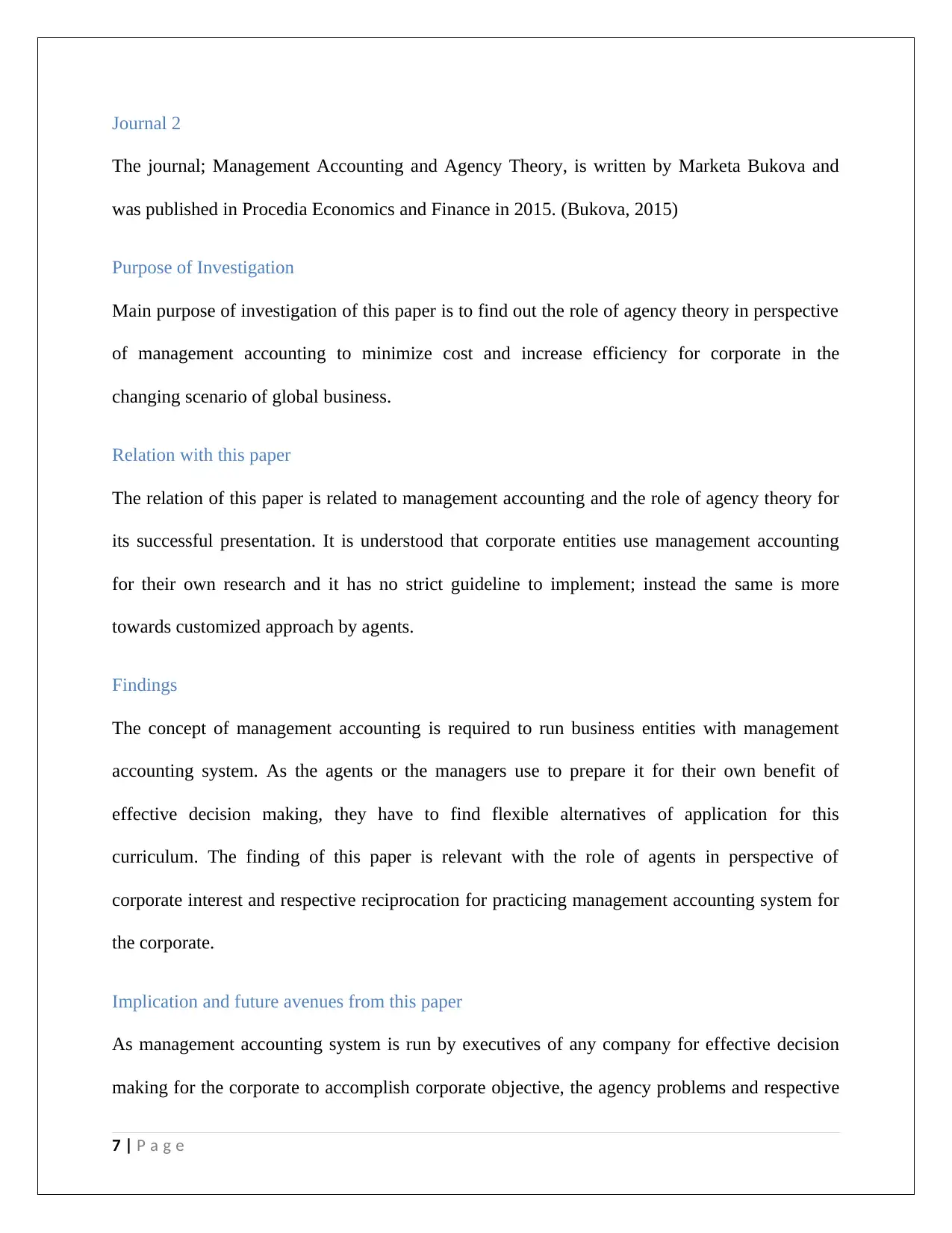
Journal 2
The journal; Management Accounting and Agency Theory, is written by Marketa Bukova and
was published in Procedia Economics and Finance in 2015. (Bukova, 2015)
Purpose of Investigation
Main purpose of investigation of this paper is to find out the role of agency theory in perspective
of management accounting to minimize cost and increase efficiency for corporate in the
changing scenario of global business.
Relation with this paper
The relation of this paper is related to management accounting and the role of agency theory for
its successful presentation. It is understood that corporate entities use management accounting
for their own research and it has no strict guideline to implement; instead the same is more
towards customized approach by agents.
Findings
The concept of management accounting is required to run business entities with management
accounting system. As the agents or the managers use to prepare it for their own benefit of
effective decision making, they have to find flexible alternatives of application for this
curriculum. The finding of this paper is relevant with the role of agents in perspective of
corporate interest and respective reciprocation for practicing management accounting system for
the corporate.
Implication and future avenues from this paper
As management accounting system is run by executives of any company for effective decision
making for the corporate to accomplish corporate objective, the agency problems and respective
7 | P a g e
The journal; Management Accounting and Agency Theory, is written by Marketa Bukova and
was published in Procedia Economics and Finance in 2015. (Bukova, 2015)
Purpose of Investigation
Main purpose of investigation of this paper is to find out the role of agency theory in perspective
of management accounting to minimize cost and increase efficiency for corporate in the
changing scenario of global business.
Relation with this paper
The relation of this paper is related to management accounting and the role of agency theory for
its successful presentation. It is understood that corporate entities use management accounting
for their own research and it has no strict guideline to implement; instead the same is more
towards customized approach by agents.
Findings
The concept of management accounting is required to run business entities with management
accounting system. As the agents or the managers use to prepare it for their own benefit of
effective decision making, they have to find flexible alternatives of application for this
curriculum. The finding of this paper is relevant with the role of agents in perspective of
corporate interest and respective reciprocation for practicing management accounting system for
the corporate.
Implication and future avenues from this paper
As management accounting system is run by executives of any company for effective decision
making for the corporate to accomplish corporate objective, the agency problems and respective
7 | P a g e
Paraphrase This Document
Need a fresh take? Get an instant paraphrase of this document with our AI Paraphraser
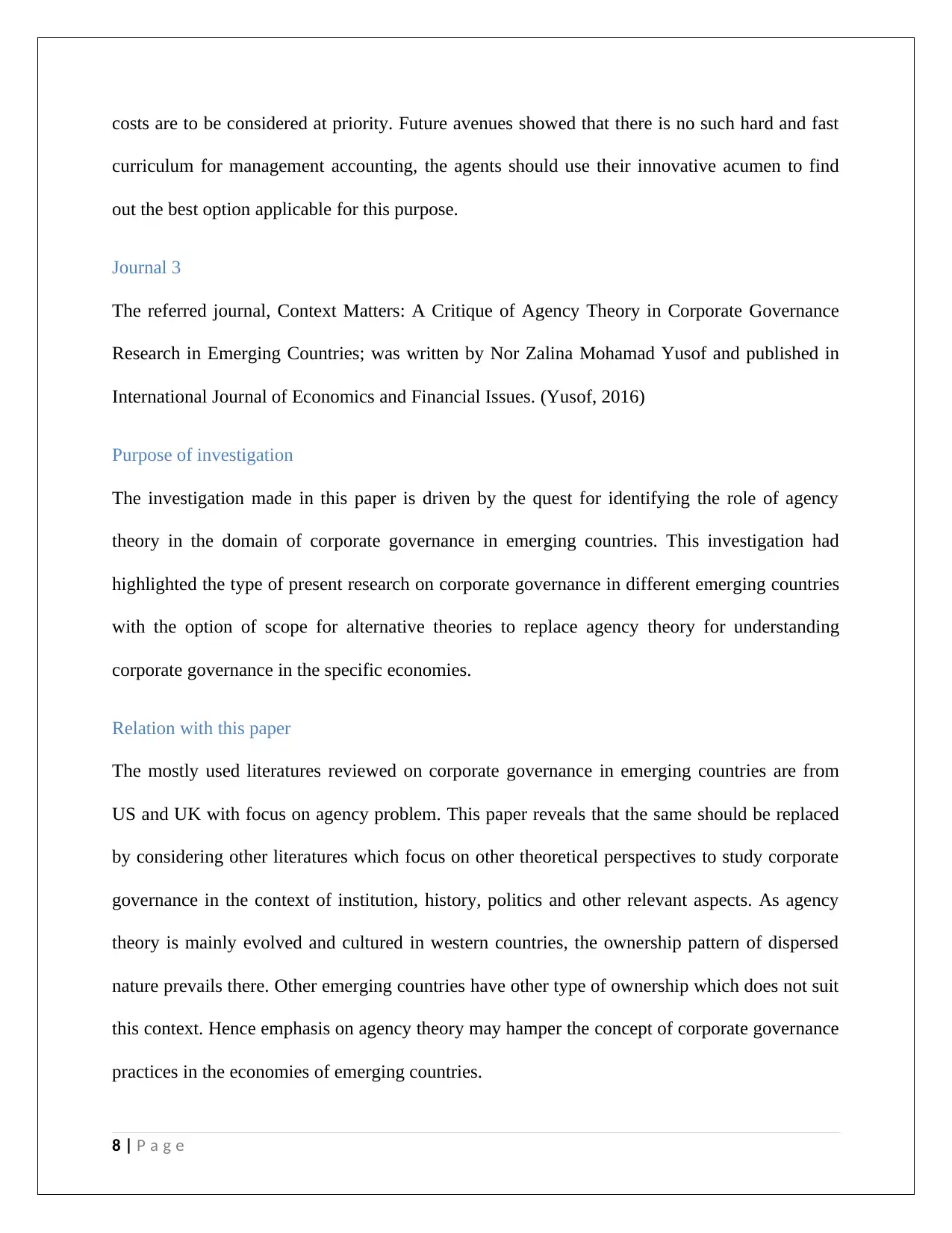
costs are to be considered at priority. Future avenues showed that there is no such hard and fast
curriculum for management accounting, the agents should use their innovative acumen to find
out the best option applicable for this purpose.
Journal 3
The referred journal, Context Matters: A Critique of Agency Theory in Corporate Governance
Research in Emerging Countries; was written by Nor Zalina Mohamad Yusof and published in
International Journal of Economics and Financial Issues. (Yusof, 2016)
Purpose of investigation
The investigation made in this paper is driven by the quest for identifying the role of agency
theory in the domain of corporate governance in emerging countries. This investigation had
highlighted the type of present research on corporate governance in different emerging countries
with the option of scope for alternative theories to replace agency theory for understanding
corporate governance in the specific economies.
Relation with this paper
The mostly used literatures reviewed on corporate governance in emerging countries are from
US and UK with focus on agency problem. This paper reveals that the same should be replaced
by considering other literatures which focus on other theoretical perspectives to study corporate
governance in the context of institution, history, politics and other relevant aspects. As agency
theory is mainly evolved and cultured in western countries, the ownership pattern of dispersed
nature prevails there. Other emerging countries have other type of ownership which does not suit
this context. Hence emphasis on agency theory may hamper the concept of corporate governance
practices in the economies of emerging countries.
8 | P a g e
curriculum for management accounting, the agents should use their innovative acumen to find
out the best option applicable for this purpose.
Journal 3
The referred journal, Context Matters: A Critique of Agency Theory in Corporate Governance
Research in Emerging Countries; was written by Nor Zalina Mohamad Yusof and published in
International Journal of Economics and Financial Issues. (Yusof, 2016)
Purpose of investigation
The investigation made in this paper is driven by the quest for identifying the role of agency
theory in the domain of corporate governance in emerging countries. This investigation had
highlighted the type of present research on corporate governance in different emerging countries
with the option of scope for alternative theories to replace agency theory for understanding
corporate governance in the specific economies.
Relation with this paper
The mostly used literatures reviewed on corporate governance in emerging countries are from
US and UK with focus on agency problem. This paper reveals that the same should be replaced
by considering other literatures which focus on other theoretical perspectives to study corporate
governance in the context of institution, history, politics and other relevant aspects. As agency
theory is mainly evolved and cultured in western countries, the ownership pattern of dispersed
nature prevails there. Other emerging countries have other type of ownership which does not suit
this context. Hence emphasis on agency theory may hamper the concept of corporate governance
practices in the economies of emerging countries.
8 | P a g e
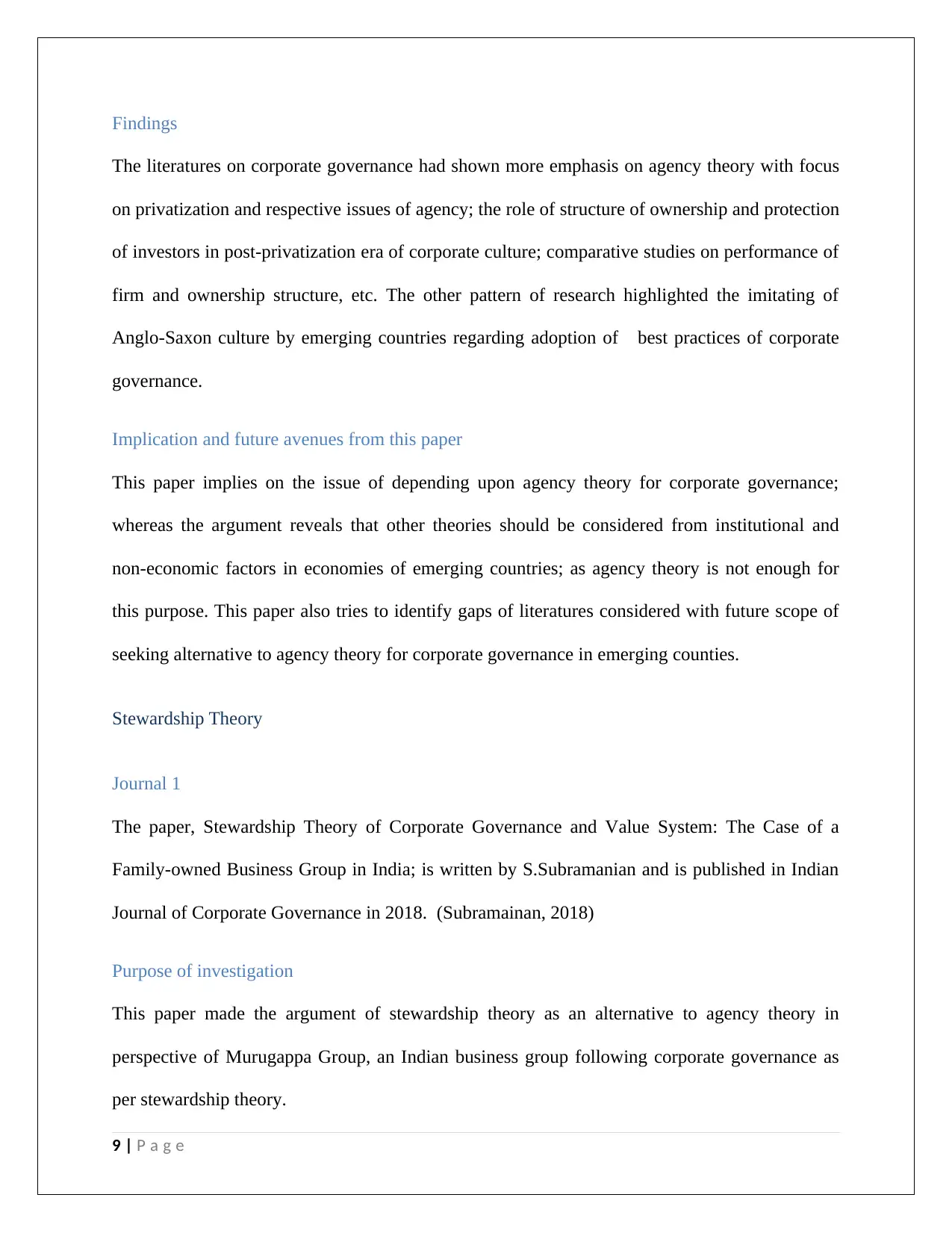
Findings
The literatures on corporate governance had shown more emphasis on agency theory with focus
on privatization and respective issues of agency; the role of structure of ownership and protection
of investors in post-privatization era of corporate culture; comparative studies on performance of
firm and ownership structure, etc. The other pattern of research highlighted the imitating of
Anglo-Saxon culture by emerging countries regarding adoption of best practices of corporate
governance.
Implication and future avenues from this paper
This paper implies on the issue of depending upon agency theory for corporate governance;
whereas the argument reveals that other theories should be considered from institutional and
non-economic factors in economies of emerging countries; as agency theory is not enough for
this purpose. This paper also tries to identify gaps of literatures considered with future scope of
seeking alternative to agency theory for corporate governance in emerging counties.
Stewardship Theory
Journal 1
The paper, Stewardship Theory of Corporate Governance and Value System: The Case of a
Family-owned Business Group in India; is written by S.Subramanian and is published in Indian
Journal of Corporate Governance in 2018. (Subramainan, 2018)
Purpose of investigation
This paper made the argument of stewardship theory as an alternative to agency theory in
perspective of Murugappa Group, an Indian business group following corporate governance as
per stewardship theory.
9 | P a g e
The literatures on corporate governance had shown more emphasis on agency theory with focus
on privatization and respective issues of agency; the role of structure of ownership and protection
of investors in post-privatization era of corporate culture; comparative studies on performance of
firm and ownership structure, etc. The other pattern of research highlighted the imitating of
Anglo-Saxon culture by emerging countries regarding adoption of best practices of corporate
governance.
Implication and future avenues from this paper
This paper implies on the issue of depending upon agency theory for corporate governance;
whereas the argument reveals that other theories should be considered from institutional and
non-economic factors in economies of emerging countries; as agency theory is not enough for
this purpose. This paper also tries to identify gaps of literatures considered with future scope of
seeking alternative to agency theory for corporate governance in emerging counties.
Stewardship Theory
Journal 1
The paper, Stewardship Theory of Corporate Governance and Value System: The Case of a
Family-owned Business Group in India; is written by S.Subramanian and is published in Indian
Journal of Corporate Governance in 2018. (Subramainan, 2018)
Purpose of investigation
This paper made the argument of stewardship theory as an alternative to agency theory in
perspective of Murugappa Group, an Indian business group following corporate governance as
per stewardship theory.
9 | P a g e
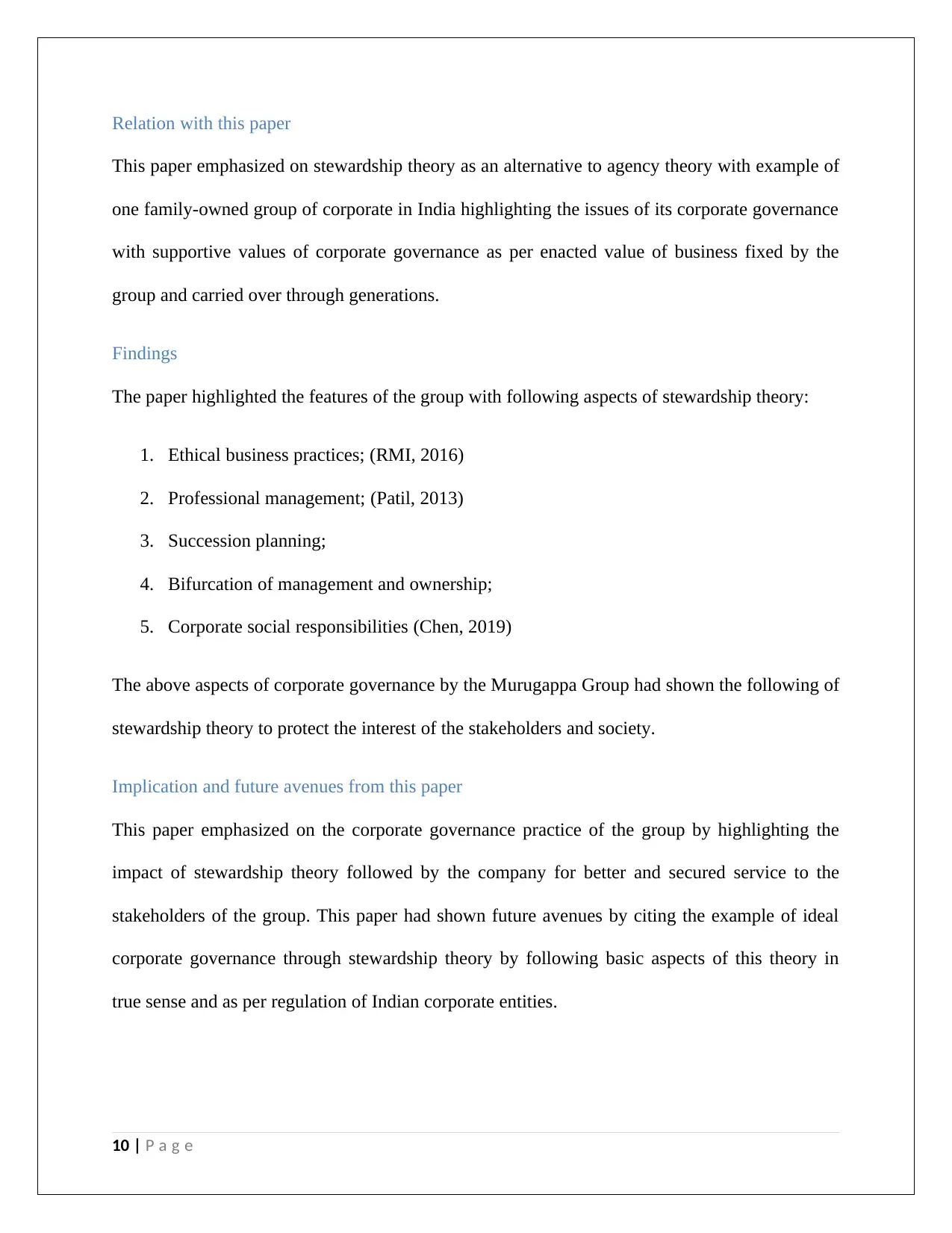
Relation with this paper
This paper emphasized on stewardship theory as an alternative to agency theory with example of
one family-owned group of corporate in India highlighting the issues of its corporate governance
with supportive values of corporate governance as per enacted value of business fixed by the
group and carried over through generations.
Findings
The paper highlighted the features of the group with following aspects of stewardship theory:
1. Ethical business practices; (RMI, 2016)
2. Professional management; (Patil, 2013)
3. Succession planning;
4. Bifurcation of management and ownership;
5. Corporate social responsibilities (Chen, 2019)
The above aspects of corporate governance by the Murugappa Group had shown the following of
stewardship theory to protect the interest of the stakeholders and society.
Implication and future avenues from this paper
This paper emphasized on the corporate governance practice of the group by highlighting the
impact of stewardship theory followed by the company for better and secured service to the
stakeholders of the group. This paper had shown future avenues by citing the example of ideal
corporate governance through stewardship theory by following basic aspects of this theory in
true sense and as per regulation of Indian corporate entities.
10 | P a g e
This paper emphasized on stewardship theory as an alternative to agency theory with example of
one family-owned group of corporate in India highlighting the issues of its corporate governance
with supportive values of corporate governance as per enacted value of business fixed by the
group and carried over through generations.
Findings
The paper highlighted the features of the group with following aspects of stewardship theory:
1. Ethical business practices; (RMI, 2016)
2. Professional management; (Patil, 2013)
3. Succession planning;
4. Bifurcation of management and ownership;
5. Corporate social responsibilities (Chen, 2019)
The above aspects of corporate governance by the Murugappa Group had shown the following of
stewardship theory to protect the interest of the stakeholders and society.
Implication and future avenues from this paper
This paper emphasized on the corporate governance practice of the group by highlighting the
impact of stewardship theory followed by the company for better and secured service to the
stakeholders of the group. This paper had shown future avenues by citing the example of ideal
corporate governance through stewardship theory by following basic aspects of this theory in
true sense and as per regulation of Indian corporate entities.
10 | P a g e
Secure Best Marks with AI Grader
Need help grading? Try our AI Grader for instant feedback on your assignments.
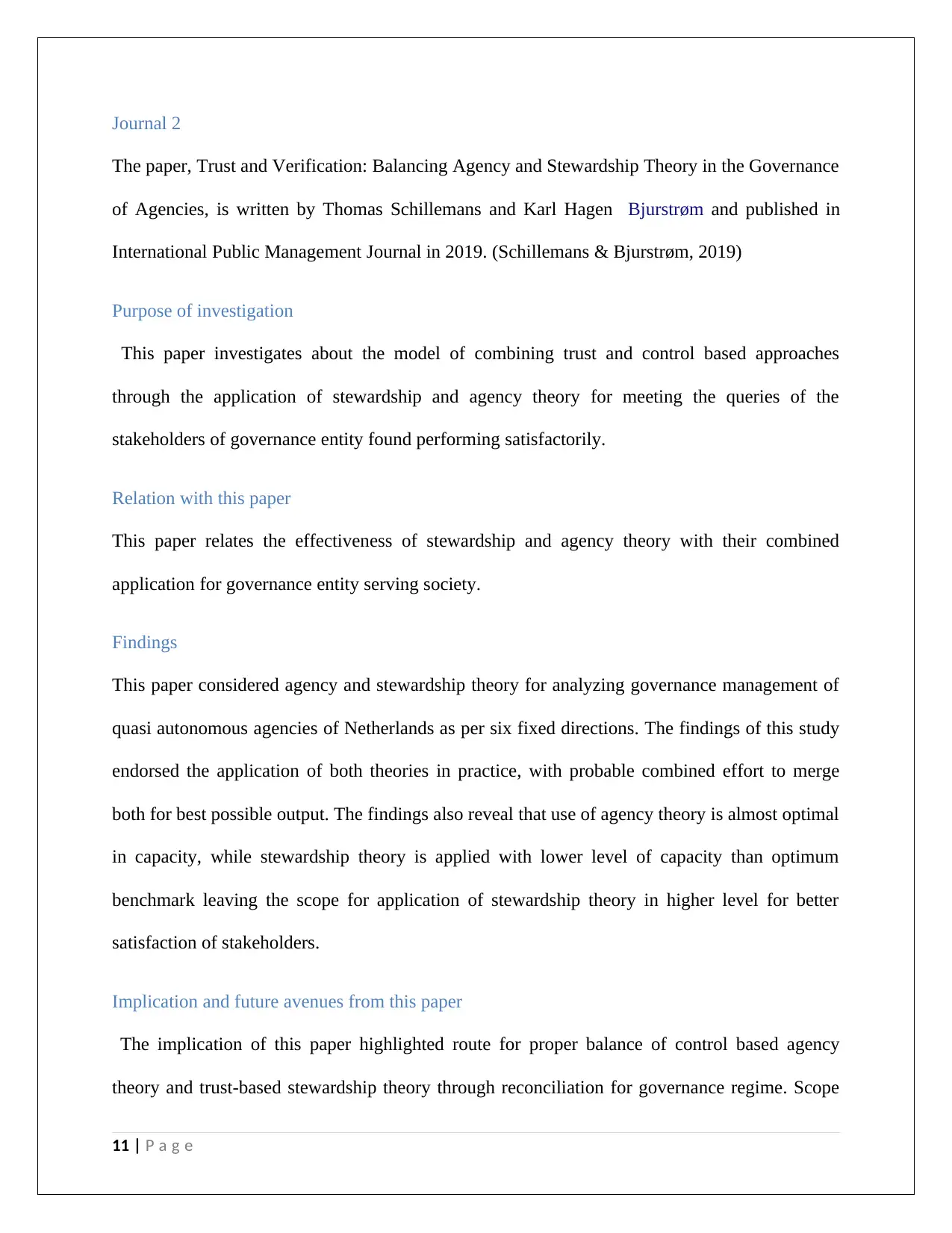
Journal 2
The paper, Trust and Verification: Balancing Agency and Stewardship Theory in the Governance
of Agencies, is written by Thomas Schillemans and Karl Hagen Bjurstrøm and published in
International Public Management Journal in 2019. (Schillemans & Bjurstrøm, 2019)
Purpose of investigation
This paper investigates about the model of combining trust and control based approaches
through the application of stewardship and agency theory for meeting the queries of the
stakeholders of governance entity found performing satisfactorily.
Relation with this paper
This paper relates the effectiveness of stewardship and agency theory with their combined
application for governance entity serving society.
Findings
This paper considered agency and stewardship theory for analyzing governance management of
quasi autonomous agencies of Netherlands as per six fixed directions. The findings of this study
endorsed the application of both theories in practice, with probable combined effort to merge
both for best possible output. The findings also reveal that use of agency theory is almost optimal
in capacity, while stewardship theory is applied with lower level of capacity than optimum
benchmark leaving the scope for application of stewardship theory in higher level for better
satisfaction of stakeholders.
Implication and future avenues from this paper
The implication of this paper highlighted route for proper balance of control based agency
theory and trust-based stewardship theory through reconciliation for governance regime. Scope
11 | P a g e
The paper, Trust and Verification: Balancing Agency and Stewardship Theory in the Governance
of Agencies, is written by Thomas Schillemans and Karl Hagen Bjurstrøm and published in
International Public Management Journal in 2019. (Schillemans & Bjurstrøm, 2019)
Purpose of investigation
This paper investigates about the model of combining trust and control based approaches
through the application of stewardship and agency theory for meeting the queries of the
stakeholders of governance entity found performing satisfactorily.
Relation with this paper
This paper relates the effectiveness of stewardship and agency theory with their combined
application for governance entity serving society.
Findings
This paper considered agency and stewardship theory for analyzing governance management of
quasi autonomous agencies of Netherlands as per six fixed directions. The findings of this study
endorsed the application of both theories in practice, with probable combined effort to merge
both for best possible output. The findings also reveal that use of agency theory is almost optimal
in capacity, while stewardship theory is applied with lower level of capacity than optimum
benchmark leaving the scope for application of stewardship theory in higher level for better
satisfaction of stakeholders.
Implication and future avenues from this paper
The implication of this paper highlighted route for proper balance of control based agency
theory and trust-based stewardship theory through reconciliation for governance regime. Scope
11 | P a g e
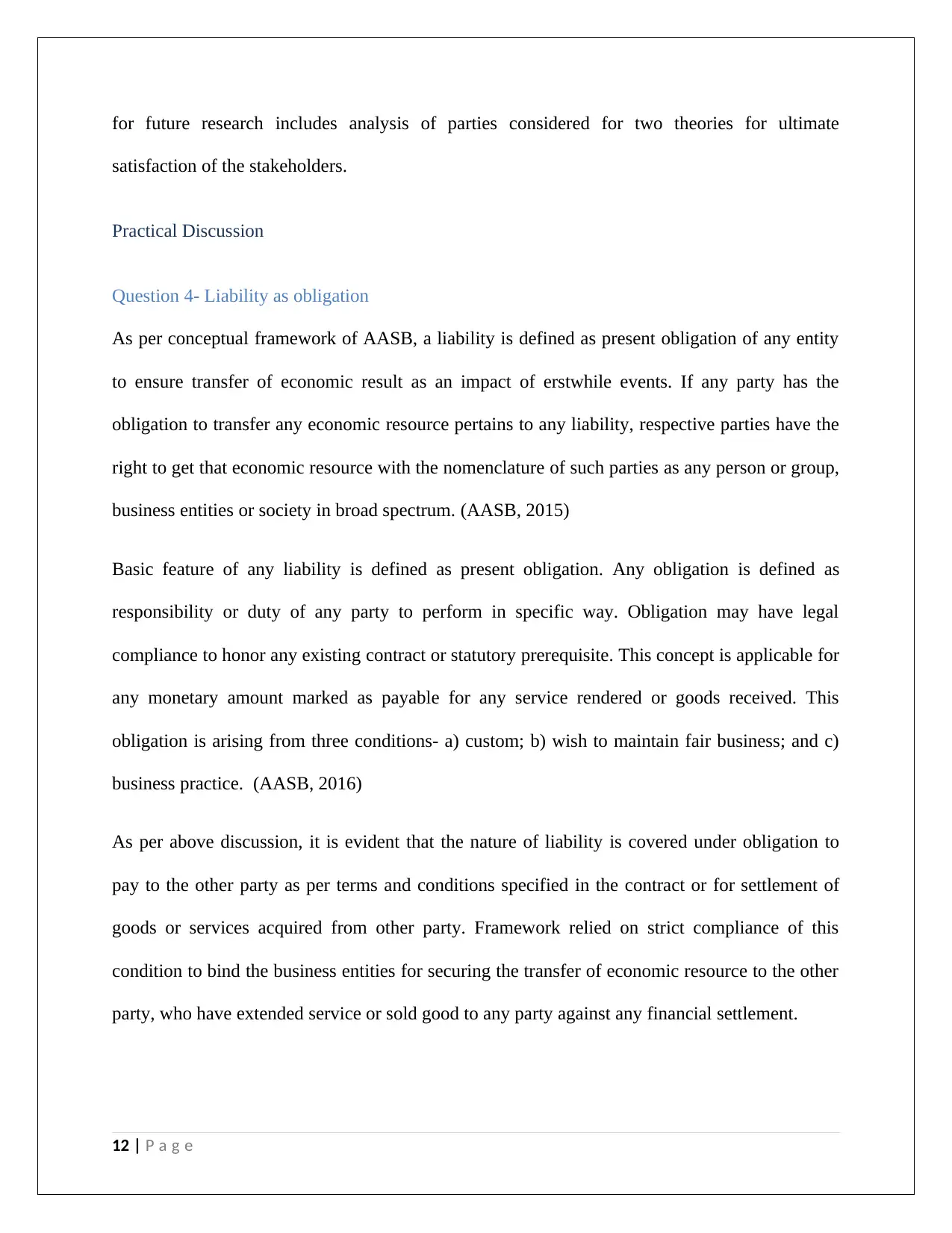
for future research includes analysis of parties considered for two theories for ultimate
satisfaction of the stakeholders.
Practical Discussion
Question 4- Liability as obligation
As per conceptual framework of AASB, a liability is defined as present obligation of any entity
to ensure transfer of economic result as an impact of erstwhile events. If any party has the
obligation to transfer any economic resource pertains to any liability, respective parties have the
right to get that economic resource with the nomenclature of such parties as any person or group,
business entities or society in broad spectrum. (AASB, 2015)
Basic feature of any liability is defined as present obligation. Any obligation is defined as
responsibility or duty of any party to perform in specific way. Obligation may have legal
compliance to honor any existing contract or statutory prerequisite. This concept is applicable for
any monetary amount marked as payable for any service rendered or goods received. This
obligation is arising from three conditions- a) custom; b) wish to maintain fair business; and c)
business practice. (AASB, 2016)
As per above discussion, it is evident that the nature of liability is covered under obligation to
pay to the other party as per terms and conditions specified in the contract or for settlement of
goods or services acquired from other party. Framework relied on strict compliance of this
condition to bind the business entities for securing the transfer of economic resource to the other
party, who have extended service or sold good to any party against any financial settlement.
12 | P a g e
satisfaction of the stakeholders.
Practical Discussion
Question 4- Liability as obligation
As per conceptual framework of AASB, a liability is defined as present obligation of any entity
to ensure transfer of economic result as an impact of erstwhile events. If any party has the
obligation to transfer any economic resource pertains to any liability, respective parties have the
right to get that economic resource with the nomenclature of such parties as any person or group,
business entities or society in broad spectrum. (AASB, 2015)
Basic feature of any liability is defined as present obligation. Any obligation is defined as
responsibility or duty of any party to perform in specific way. Obligation may have legal
compliance to honor any existing contract or statutory prerequisite. This concept is applicable for
any monetary amount marked as payable for any service rendered or goods received. This
obligation is arising from three conditions- a) custom; b) wish to maintain fair business; and c)
business practice. (AASB, 2016)
As per above discussion, it is evident that the nature of liability is covered under obligation to
pay to the other party as per terms and conditions specified in the contract or for settlement of
goods or services acquired from other party. Framework relied on strict compliance of this
condition to bind the business entities for securing the transfer of economic resource to the other
party, who have extended service or sold good to any party against any financial settlement.
12 | P a g e
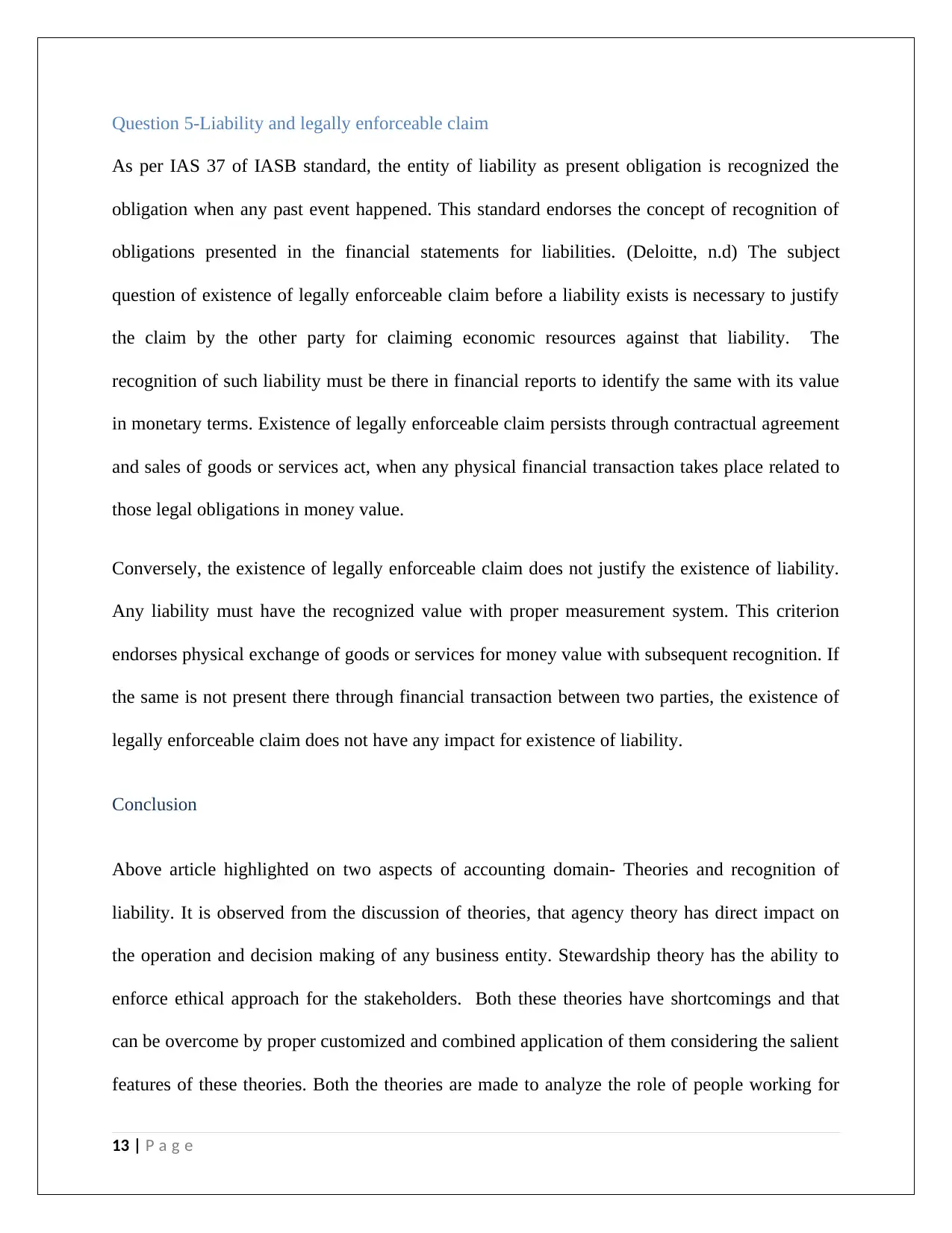
Question 5-Liability and legally enforceable claim
As per IAS 37 of IASB standard, the entity of liability as present obligation is recognized the
obligation when any past event happened. This standard endorses the concept of recognition of
obligations presented in the financial statements for liabilities. (Deloitte, n.d) The subject
question of existence of legally enforceable claim before a liability exists is necessary to justify
the claim by the other party for claiming economic resources against that liability. The
recognition of such liability must be there in financial reports to identify the same with its value
in monetary terms. Existence of legally enforceable claim persists through contractual agreement
and sales of goods or services act, when any physical financial transaction takes place related to
those legal obligations in money value.
Conversely, the existence of legally enforceable claim does not justify the existence of liability.
Any liability must have the recognized value with proper measurement system. This criterion
endorses physical exchange of goods or services for money value with subsequent recognition. If
the same is not present there through financial transaction between two parties, the existence of
legally enforceable claim does not have any impact for existence of liability.
Conclusion
Above article highlighted on two aspects of accounting domain- Theories and recognition of
liability. It is observed from the discussion of theories, that agency theory has direct impact on
the operation and decision making of any business entity. Stewardship theory has the ability to
enforce ethical approach for the stakeholders. Both these theories have shortcomings and that
can be overcome by proper customized and combined application of them considering the salient
features of these theories. Both the theories are made to analyze the role of people working for
13 | P a g e
As per IAS 37 of IASB standard, the entity of liability as present obligation is recognized the
obligation when any past event happened. This standard endorses the concept of recognition of
obligations presented in the financial statements for liabilities. (Deloitte, n.d) The subject
question of existence of legally enforceable claim before a liability exists is necessary to justify
the claim by the other party for claiming economic resources against that liability. The
recognition of such liability must be there in financial reports to identify the same with its value
in monetary terms. Existence of legally enforceable claim persists through contractual agreement
and sales of goods or services act, when any physical financial transaction takes place related to
those legal obligations in money value.
Conversely, the existence of legally enforceable claim does not justify the existence of liability.
Any liability must have the recognized value with proper measurement system. This criterion
endorses physical exchange of goods or services for money value with subsequent recognition. If
the same is not present there through financial transaction between two parties, the existence of
legally enforceable claim does not have any impact for existence of liability.
Conclusion
Above article highlighted on two aspects of accounting domain- Theories and recognition of
liability. It is observed from the discussion of theories, that agency theory has direct impact on
the operation and decision making of any business entity. Stewardship theory has the ability to
enforce ethical approach for the stakeholders. Both these theories have shortcomings and that
can be overcome by proper customized and combined application of them considering the salient
features of these theories. Both the theories are made to analyze the role of people working for
13 | P a g e
Paraphrase This Document
Need a fresh take? Get an instant paraphrase of this document with our AI Paraphraser
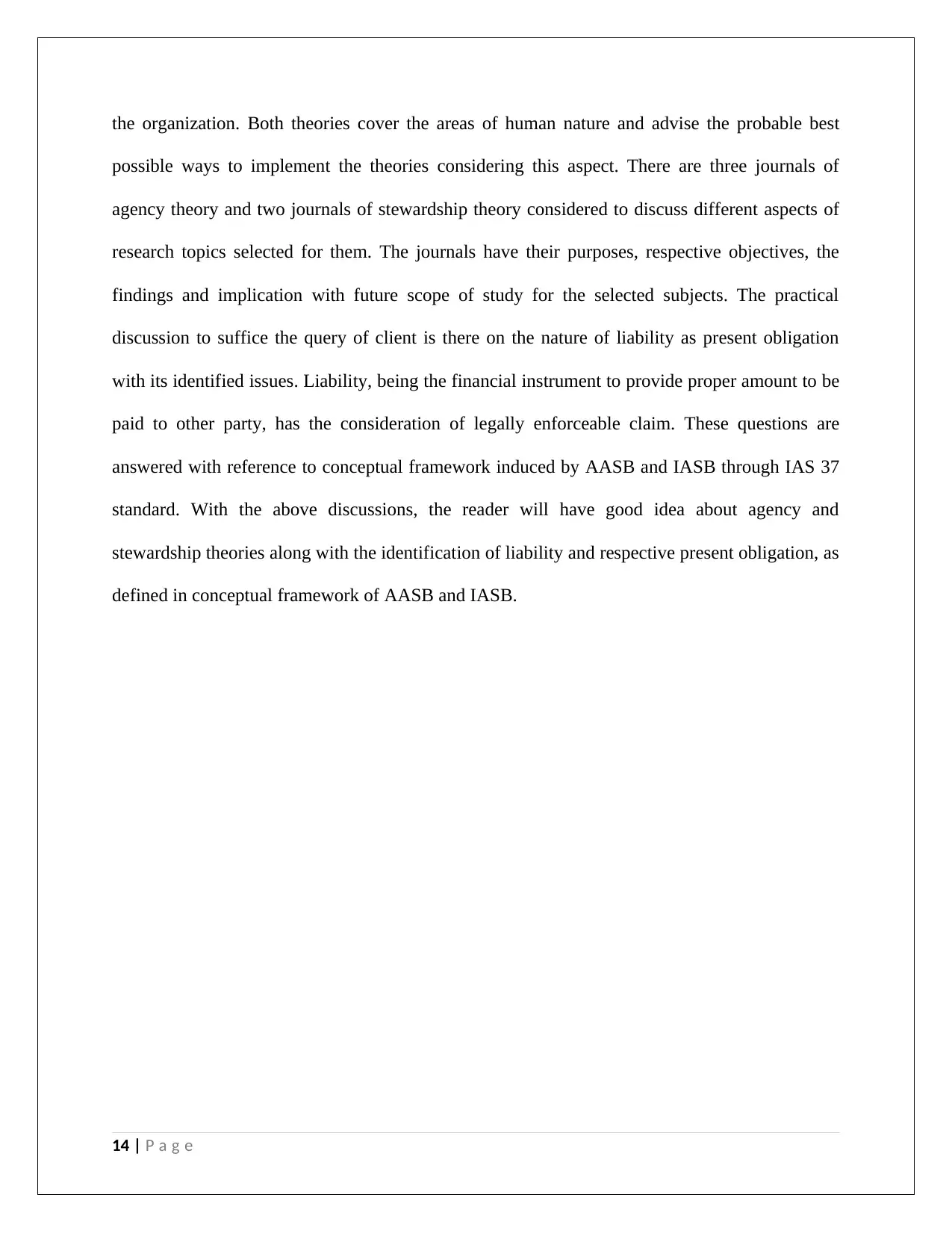
the organization. Both theories cover the areas of human nature and advise the probable best
possible ways to implement the theories considering this aspect. There are three journals of
agency theory and two journals of stewardship theory considered to discuss different aspects of
research topics selected for them. The journals have their purposes, respective objectives, the
findings and implication with future scope of study for the selected subjects. The practical
discussion to suffice the query of client is there on the nature of liability as present obligation
with its identified issues. Liability, being the financial instrument to provide proper amount to be
paid to other party, has the consideration of legally enforceable claim. These questions are
answered with reference to conceptual framework induced by AASB and IASB through IAS 37
standard. With the above discussions, the reader will have good idea about agency and
stewardship theories along with the identification of liability and respective present obligation, as
defined in conceptual framework of AASB and IASB.
14 | P a g e
possible ways to implement the theories considering this aspect. There are three journals of
agency theory and two journals of stewardship theory considered to discuss different aspects of
research topics selected for them. The journals have their purposes, respective objectives, the
findings and implication with future scope of study for the selected subjects. The practical
discussion to suffice the query of client is there on the nature of liability as present obligation
with its identified issues. Liability, being the financial instrument to provide proper amount to be
paid to other party, has the consideration of legally enforceable claim. These questions are
answered with reference to conceptual framework induced by AASB and IASB through IAS 37
standard. With the above discussions, the reader will have good idea about agency and
stewardship theories along with the identification of liability and respective present obligation, as
defined in conceptual framework of AASB and IASB.
14 | P a g e
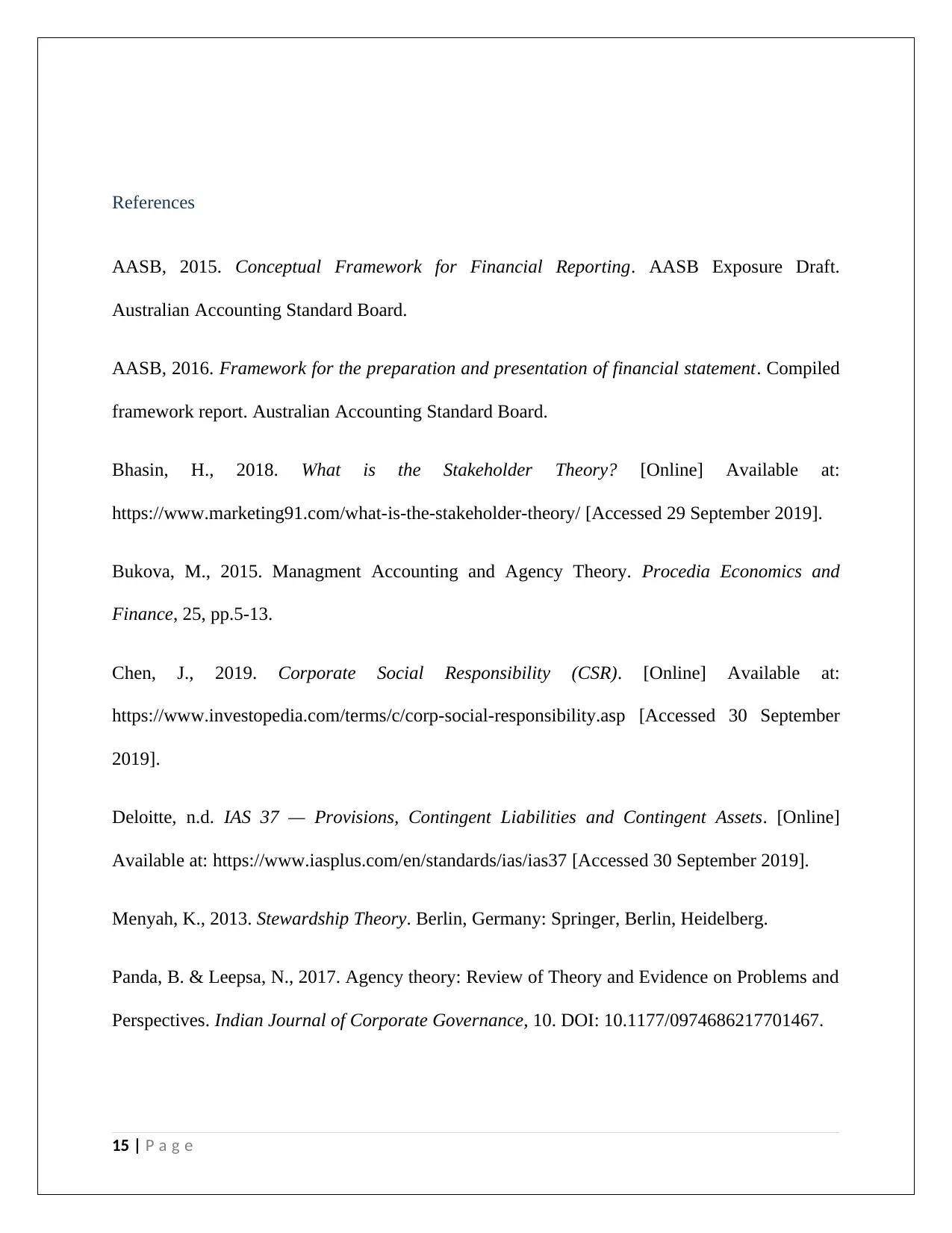
References
AASB, 2015. Conceptual Framework for Financial Reporting. AASB Exposure Draft.
Australian Accounting Standard Board.
AASB, 2016. Framework for the preparation and presentation of financial statement. Compiled
framework report. Australian Accounting Standard Board.
Bhasin, H., 2018. What is the Stakeholder Theory? [Online] Available at:
https://www.marketing91.com/what-is-the-stakeholder-theory/ [Accessed 29 September 2019].
Bukova, M., 2015. Managment Accounting and Agency Theory. Procedia Economics and
Finance, 25, pp.5-13.
Chen, J., 2019. Corporate Social Responsibility (CSR). [Online] Available at:
https://www.investopedia.com/terms/c/corp-social-responsibility.asp [Accessed 30 September
2019].
Deloitte, n.d. IAS 37 — Provisions, Contingent Liabilities and Contingent Assets. [Online]
Available at: https://www.iasplus.com/en/standards/ias/ias37 [Accessed 30 September 2019].
Menyah, K., 2013. Stewardship Theory. Berlin, Germany: Springer, Berlin, Heidelberg.
Panda, B. & Leepsa, N., 2017. Agency theory: Review of Theory and Evidence on Problems and
Perspectives. Indian Journal of Corporate Governance, 10. DOI: 10.1177/0974686217701467.
15 | P a g e
AASB, 2015. Conceptual Framework for Financial Reporting. AASB Exposure Draft.
Australian Accounting Standard Board.
AASB, 2016. Framework for the preparation and presentation of financial statement. Compiled
framework report. Australian Accounting Standard Board.
Bhasin, H., 2018. What is the Stakeholder Theory? [Online] Available at:
https://www.marketing91.com/what-is-the-stakeholder-theory/ [Accessed 29 September 2019].
Bukova, M., 2015. Managment Accounting and Agency Theory. Procedia Economics and
Finance, 25, pp.5-13.
Chen, J., 2019. Corporate Social Responsibility (CSR). [Online] Available at:
https://www.investopedia.com/terms/c/corp-social-responsibility.asp [Accessed 30 September
2019].
Deloitte, n.d. IAS 37 — Provisions, Contingent Liabilities and Contingent Assets. [Online]
Available at: https://www.iasplus.com/en/standards/ias/ias37 [Accessed 30 September 2019].
Menyah, K., 2013. Stewardship Theory. Berlin, Germany: Springer, Berlin, Heidelberg.
Panda, B. & Leepsa, N., 2017. Agency theory: Review of Theory and Evidence on Problems and
Perspectives. Indian Journal of Corporate Governance, 10. DOI: 10.1177/0974686217701467.
15 | P a g e
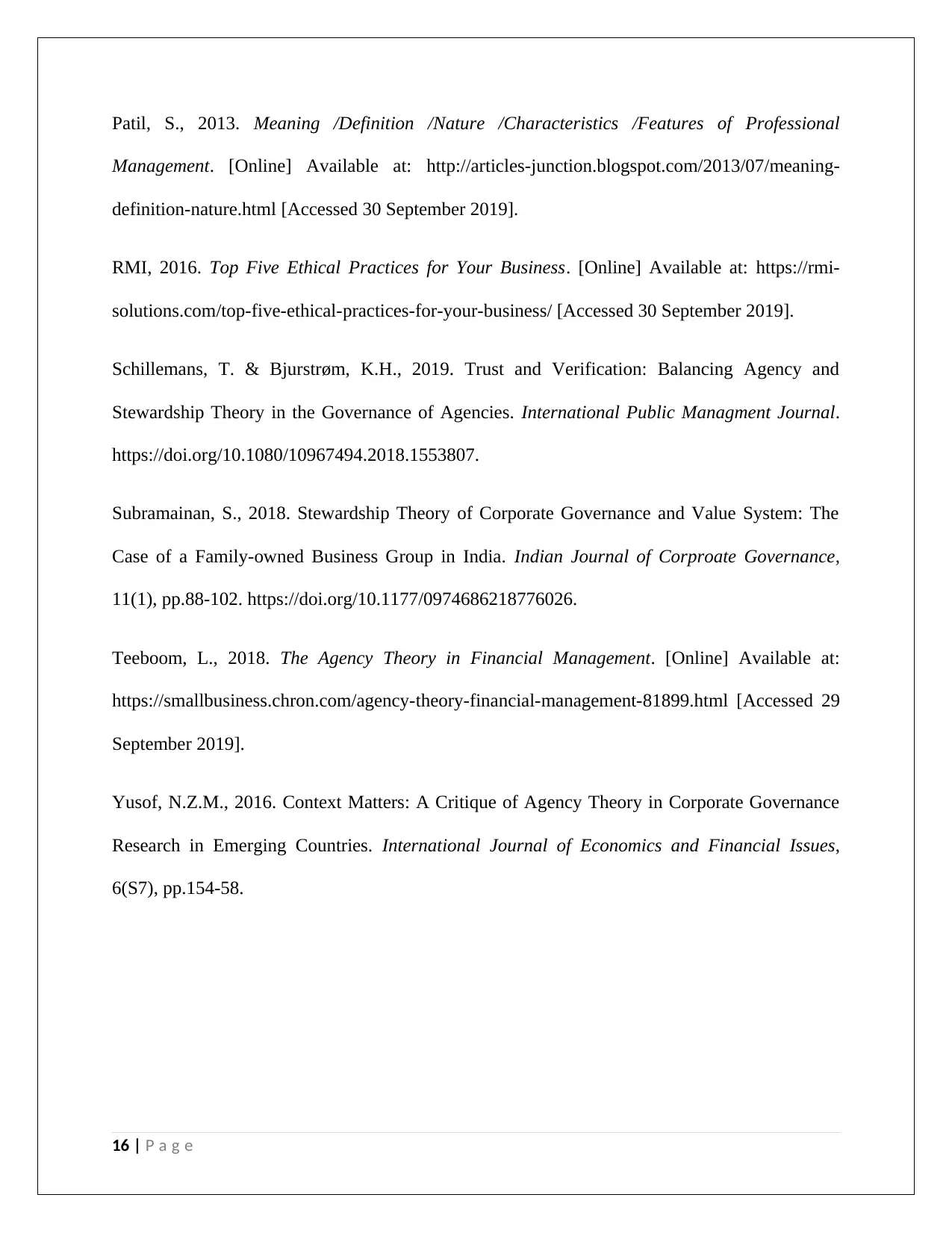
Patil, S., 2013. Meaning /Definition /Nature /Characteristics /Features of Professional
Management. [Online] Available at: http://articles-junction.blogspot.com/2013/07/meaning-
definition-nature.html [Accessed 30 September 2019].
RMI, 2016. Top Five Ethical Practices for Your Business. [Online] Available at: https://rmi-
solutions.com/top-five-ethical-practices-for-your-business/ [Accessed 30 September 2019].
Schillemans, T. & Bjurstrøm, K.H., 2019. Trust and Verification: Balancing Agency and
Stewardship Theory in the Governance of Agencies. International Public Managment Journal.
https://doi.org/10.1080/10967494.2018.1553807.
Subramainan, S., 2018. Stewardship Theory of Corporate Governance and Value System: The
Case of a Family-owned Business Group in India. Indian Journal of Corproate Governance,
11(1), pp.88-102. https://doi.org/10.1177/0974686218776026.
Teeboom, L., 2018. The Agency Theory in Financial Management. [Online] Available at:
https://smallbusiness.chron.com/agency-theory-financial-management-81899.html [Accessed 29
September 2019].
Yusof, N.Z.M., 2016. Context Matters: A Critique of Agency Theory in Corporate Governance
Research in Emerging Countries. International Journal of Economics and Financial Issues,
6(S7), pp.154-58.
16 | P a g e
Management. [Online] Available at: http://articles-junction.blogspot.com/2013/07/meaning-
definition-nature.html [Accessed 30 September 2019].
RMI, 2016. Top Five Ethical Practices for Your Business. [Online] Available at: https://rmi-
solutions.com/top-five-ethical-practices-for-your-business/ [Accessed 30 September 2019].
Schillemans, T. & Bjurstrøm, K.H., 2019. Trust and Verification: Balancing Agency and
Stewardship Theory in the Governance of Agencies. International Public Managment Journal.
https://doi.org/10.1080/10967494.2018.1553807.
Subramainan, S., 2018. Stewardship Theory of Corporate Governance and Value System: The
Case of a Family-owned Business Group in India. Indian Journal of Corproate Governance,
11(1), pp.88-102. https://doi.org/10.1177/0974686218776026.
Teeboom, L., 2018. The Agency Theory in Financial Management. [Online] Available at:
https://smallbusiness.chron.com/agency-theory-financial-management-81899.html [Accessed 29
September 2019].
Yusof, N.Z.M., 2016. Context Matters: A Critique of Agency Theory in Corporate Governance
Research in Emerging Countries. International Journal of Economics and Financial Issues,
6(S7), pp.154-58.
16 | P a g e
1 out of 16
Your All-in-One AI-Powered Toolkit for Academic Success.
+13062052269
info@desklib.com
Available 24*7 on WhatsApp / Email
![[object Object]](/_next/static/media/star-bottom.7253800d.svg)
Unlock your academic potential
© 2024 | Zucol Services PVT LTD | All rights reserved.





